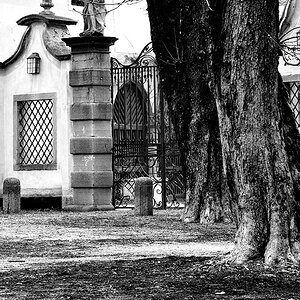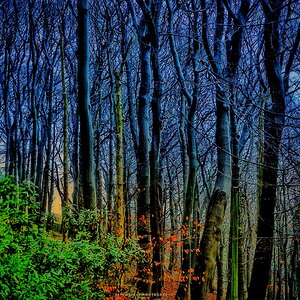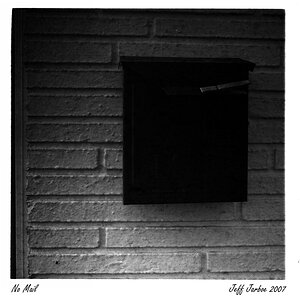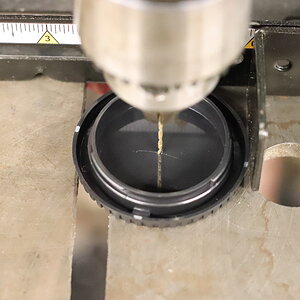Alpha
Troll Extraordinaire
- Joined
- Mar 15, 2005
- Messages
- 5,451
- Reaction score
- 41
- Location
- San Francisco
- Can others edit my Photos
- Photos NOT OK to edit
is the better learning medium, for me.
Cost
Cost is on everyone's mind, particularly beginners. Film and digital shooters go back and forth incessantly about whose workflow is more cost-effective. The pros and cons for those who shoot commercial or high volume work I won't bother going into here.
Pixel for pixel (or dot, or line if you prefer), digital requires a much larger initial outlay of money.
Film adds up in cost. But for the average hobbyist, or serious hobbyist like myself who doesn't shoot very often, shooting film allows one in a sense to put their hobby on lay-away.
Instant Feedback
Is overrated. With a few rolls of film and good notes, one should be able to bracket exposure, focal length, and aperture. Those few rolls serve as a launching point and a reference for all future work. The same can be done with digital, but how many people do that when they first get their camera, and from then on stop chimping? Almost no one. Trust yourself. Trust your equipment.
Metaphysics and the option to delete
The option to delete is too tempting with digital, whether for reasons of dislike or available hard drive space. Binders full of tangible, poor negatives, serve as a reminder more powerful in my opinion, of where one's been, and just how much **** they've produced.
Getting it right in camera
There is such a thing in digital, but it's not quite the same. For the seasoned photoshop user, an excellent shot out of camera may require minimal editing. But digital post-processing is nearly always a requirement in shooting digital. Thus, this tasks the beginning digital photographer with not only learning how to properly use their camera, but how to properly use their software. The latter I feel is often more complicated and sometimes more nuanced. It is too easy for the beginner to get their wires crossed...for it to be unclear whether a poor photo is the result of poor shooting or poor editing. This makes the process of deciding independently whether a photo is shot well and/or processed well an often confusing and daunting task as a result of multiple simultaneous learning curves. I argue the same point in the film world. Developing your first roll of film easily creates confusion about whether the final product is the result of shooting or of developing.
perhaps more to come
Cost
Cost is on everyone's mind, particularly beginners. Film and digital shooters go back and forth incessantly about whose workflow is more cost-effective. The pros and cons for those who shoot commercial or high volume work I won't bother going into here.
Pixel for pixel (or dot, or line if you prefer), digital requires a much larger initial outlay of money.
Film adds up in cost. But for the average hobbyist, or serious hobbyist like myself who doesn't shoot very often, shooting film allows one in a sense to put their hobby on lay-away.
Instant Feedback
Is overrated. With a few rolls of film and good notes, one should be able to bracket exposure, focal length, and aperture. Those few rolls serve as a launching point and a reference for all future work. The same can be done with digital, but how many people do that when they first get their camera, and from then on stop chimping? Almost no one. Trust yourself. Trust your equipment.
Metaphysics and the option to delete
The option to delete is too tempting with digital, whether for reasons of dislike or available hard drive space. Binders full of tangible, poor negatives, serve as a reminder more powerful in my opinion, of where one's been, and just how much **** they've produced.
Getting it right in camera
There is such a thing in digital, but it's not quite the same. For the seasoned photoshop user, an excellent shot out of camera may require minimal editing. But digital post-processing is nearly always a requirement in shooting digital. Thus, this tasks the beginning digital photographer with not only learning how to properly use their camera, but how to properly use their software. The latter I feel is often more complicated and sometimes more nuanced. It is too easy for the beginner to get their wires crossed...for it to be unclear whether a poor photo is the result of poor shooting or poor editing. This makes the process of deciding independently whether a photo is shot well and/or processed well an often confusing and daunting task as a result of multiple simultaneous learning curves. I argue the same point in the film world. Developing your first roll of film easily creates confusion about whether the final product is the result of shooting or of developing.
perhaps more to come



 Makes it fell more like the old days.
Makes it fell more like the old days. 


![[No title]](/data/xfmg/thumbnail/31/31038-84f0b9d14b7ced20e61bc19a9d4dfcc2.jpg?1619734581)

![[No title]](/data/xfmg/thumbnail/34/34123-da7d55491fec06595061191321c92646.jpg?1619736293)
![[No title]](/data/xfmg/thumbnail/39/39271-04ff6ce1fbcda2b0d41ad7ee08cff91a.jpg?1619738950)




![[No title]](/data/xfmg/thumbnail/35/35957-c79b37130dc06cbdee3b56de92a35fe6.jpg?1619737270)